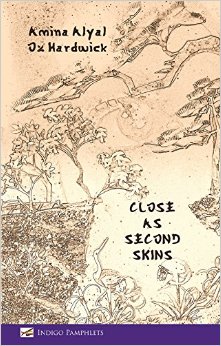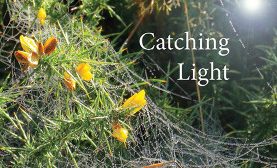Bodies by Gareth Writer–Davies
– Reviewed by Fiona Sinclair –
Gareth Writer-Davies’ Bodies encourages us to be reconciled with the bodies we inhabit, wondering at the component parts of these excellent machines, armpits and bowels, suggesting a symbiosis between mind and body that makes up the essential person. The poet makes playful use of form, reflecting his subject. In ‘String’, the layout suggests fragmentation of a mother’s mind, due, one assumes, to dementia. We begin to understand the breaking down of thought processes, the loss of data once stored in a head that now ‘cannot hold a clue’. In ‘Ambidextrous’, a double-sided layout wittily shows two sides of a personality, emphasising tension between the good and the bad. The poem’s justification aligns at the end of the work, reflecting times when, like brothers, both sides of the brain must pull together.
This collection is well-ordered. It begins with the speaker as a foetus and ends with death – not of the narrator, but of the father – in the final poem ‘Bones’, which reinforces our place in the natural world. Many poems place the human body within the context of nature. The child in ‘Little Weed’ is underdeveloped, the weed a metaphor for the speaker’s own sense of inferiority; ‘Gut Flora’ makes the gut and its workings part of a natural process, the lexis abounding with gardening images: ‘the great intestinal gardener’, ‘to bring forth night soil’. A wonderful seam of humour runs through the collection, especially deployed regarding the deficiencies of the speaker’s own body. ‘I should have been taller’ regrets that, coming from a family of tall men, the speaker’s lot is to be ‘forced to look up to others’, laughs had with the line ‘only my large feet kept me from blowing over’, which creates a cartoon image. The poet’s skill lies in undercutting humour with the bitter truth that this lack of height left its scars, ‘regulated my bile with milk’. Only at the end of the poem ‘my digestion of the bitter pill is so much better’, with a sense of coming to terms with the curveball his DNA threw at him.
A sense that body and spirit combine to make personality runs through the collection. ‘Ambidextrous’ is key in this. The right hand is ’sinister in its motivation’, while the left ’you could trust with your money or your wife’. Thus the body and its quirkiness is seen to influence personality. This is shown again in ‘Ode to a Spleen’, traditionally thought of as the organ of anger and bitterness, and the poem plays on this idea. By contrast, ‘My Heart’ denies all links to the traditional seat of love, yet the poem’s constant avowal that ‘my heart has no enthusiasm for declarations of love’ seems to hint at a character who can in fact love very deeply, and rejects the heart as the common symbol of emotion, seeing it as clichéd and insufficient to represent his feelings. He is at pains to redact the heart back to its functional job, ‘pump the blood round my body’, yet by the end of the poem, he subtly reclaims the organ as the seat of emotion by suggesting his heart ‘has its reasons’.
In general the poems invite us to copy the speaker by accepting our bodies for what they are with all their deficiencies, yet there does seem to be a hint that this acceptance of the body is a male preserve. Two poems seem key to a female view that is less accepting, unreconciled. The poems ‘Woman in a Bath’ suggests that in her nakedness, the woman loathes her deficiencies: ‘you are thinking there is too much solid flesh’. Ironically, the man is completely accepting of his lover’s body – ‘but your belly is taut’ – and the poem skilfully alternates between her self-loathing and his love for her body, thereby flagging up differences. This is a salutary poem for all women, yet the female character is unable to realise her lover’s acceptance: ‘you kick the door back into the frame ‘, ‘you do not like me staring at you’.
This leads to a wonderful examination of the sheer mechanical genius of the body’s working parts. We are encouraged to understand and celebrate, for instance, the intricate workings of the bowel. There is no sense of disgust, instead the bowel is presented as a metaphorical garden. I particularly like ‘Axilla’, which deals with the armpit, another site of embarrassment for most humans, who try to make it acceptable with deodorants and shaving. However, in this earthy poem the female is abjured ‘do not shave your arm pit’, celebrating sweat and hair with some memorable metaphors: ‘your arm pit is a crab hiding in its shell’. The axilla is moved away from shame to be celebrated with animal enjoyment.
This is a fairly unique collection in that it focuses on one subject, with no stray poems added for the sake of it. It deploys wit well as a means of lightening darker themes. Above all, it invites us to accept the body we inhabit, not as a shell but as an intrinsic part of us with all its flaws. It invites us to marvel, rather than be ashamed of the processes and functions of this glorious machine.





